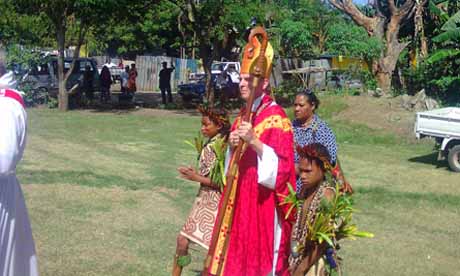The Anglican Church in Papua New Guinea has voted to accept the Anglican Communion Covenant.
Writing to the Secretary General of the decision on behalf of the House of Bishops, the Bishop of Port Moresby, the Rt Revd Peter Ramsden, said the decision was based on their understanding of the name Anglican Communion.
“Anglican” was one of the styles of Christianity brought to this land and people near the end of the nineteenth century”, he wrote. “It never pretended to be the only form of Christianity, but it did reflect how one part of the Christian family had developed, built on the importance of scripture, creeds, sacraments and episcopal order. Today we try to combine our Anglo-Catholic theological heritage and personal discipleship to the Lord Jesus in the way we witness to the five marks of mission with our ecumenical partners in PNG and our Anglican partners overseas.
“Communion”, in our understanding, describes a particular kind of close relationship which both ensures autonomy and requires responsibility. It is an expression of the fellowship of the Holy Spirit and as such is a precious gift to God’s people. It clearly requires mutual respect, open communication and patience in dealing with issues that threaten it. In recent decades we have been saddened by the apparent lack of these things in the controversies concerning the ordination of women and issues of human sexuality.”
He went on to say that the bishops felt it was important to remember the need to pray for unity beyond just the Anglican Christian tradition. “Anglicans are only part of the wider Christian “communion” that is the Church of God, which must have an important role in discerning the truth. Anglicans, we believe, have been called to live a particular style of Christian witness which, because it is less juridical and confessional than that of some others, clearly requires a high level of mutual concern and respect.
In December 2009 the Secretary General of the Anglican Communion sent the text of The Anglican Communion Covenant to all the member churches of the Anglican Communion, asking that they consider it for adoption according to their own internal procedures.
Source
